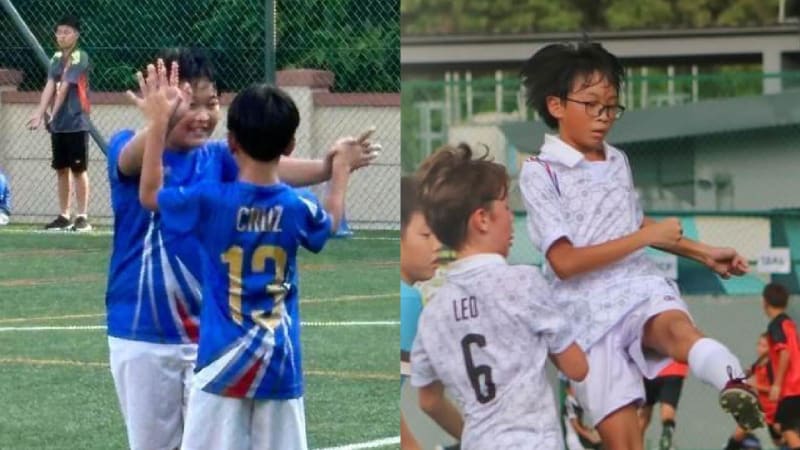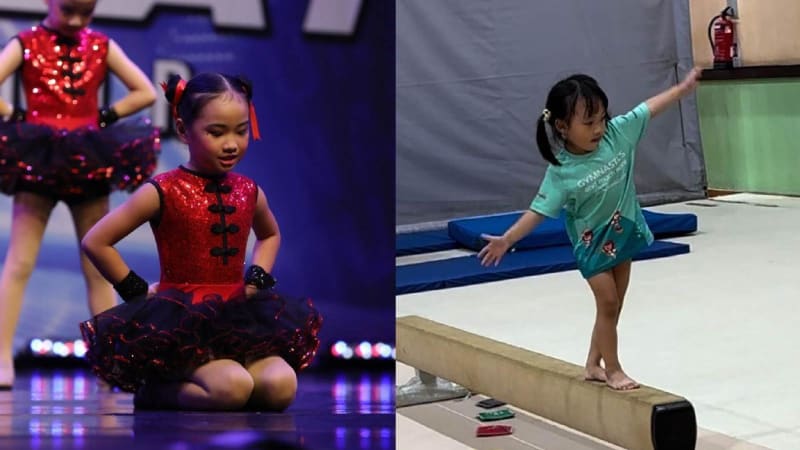I let my kids decide if they take enrichment classes or not. This is why
Are extra classes absolutely necessary for our children to enjoy a better tomorrow? Not really, mum-of-five Kelly Ang says.

For Voices writer Kelly Ang, tuition is necessary only when her children are unable to attain the results they want in spite of their best efforts. (Illustration: CNA/Samuel Woo, iStock)

This audio is generated by an AI tool.
It is a perennial debate: Are enrichment classes a must to give our child the best possible head start in life? Or are they a source of unnecessary pressure on our children?
You simply can't win this argument.
In Singapore, every parent has an opinion on enrichment classes outside of school. Do you know that we spent a gobsmacking S$1.8 billion on tuition in 2023? It is a seemingly resounding endorsement of its importance.
I’ve certainly contributed to this figure: Four of my five children attend some form of enrichment class. (The fifth is only two years old.)
“What about all that you said about not pushing your kids too hard to excel academically, Kelly? Was that all idealistic twaddle?”
Not really. Here’s my personal philosophy: Academic enrichment classes should be undertaken on a needs basis, while non-academic classes should be on an interest basis.
This is where things can quickly turn murky. Everyone’s idea of “need” is different.
I may be okay with my child scraping a pass for the mother tongue subject; another parent may feel that anything lower than an AL3 warrants intervention.
Related:
WHAT IS "NECESSARY"?
For our family, tuition is necessary when my children are unable to attain the results they want in spite of their best efforts. Perhaps they lack the correct answering skills, or have some serious misunderstandings that they simply cannot clear up with help from their school teachers.
I’d also say tuition is necessary when my husband and I are, for whatever reason, unable to give our children the guidance or support they need.
Chinese language is one such subject in our home. I encourage my children to embrace this mother tongue subject and even to learn it at a higher level if they can, but that doesn’t remove the tough practical aspects of learning a language we don’t use regularly at home.
We started off with group Chinese language classes for my oldest three children when they were in preschool. Today, my oldest son – who is taking his Primary School Leaving Examination later this year – is keeping up with Chinese tuition.
My second son has been doing alternate years of Chinese tuition, oscillating between stubborn refusal to commit to extra classes and desperation whenever he sees his grades slip. He has opted to wing it this term and wants to revisit the decision at the half-year point.
My oldest daughter who has just entered Primary 1 has stopped extra Chinese classes as well and is adamant on not taking any this year. Instead, she has agreed to do more practices with me twice weekly at home. We will see how this year unfolds and review accordingly.
My five-year-old hasn’t yet attended a single Chinese tuition class, but I plan on starting her at some point soon. It is not quite to give her a boost, but rather to prepare her so that she won’t be utterly shell-shocked upon starting Primary 1, considering that we don’t speak much of the language at home.
My two-year-old? No time for tuition of any kind. She’s just so busy being cute.
For now, other academic subjects seem to be manageable for my older children without extra tuition, so I’m happy to leave them be. (Admittedly, so is my wallet.)
ENRICHMENT ALSO INCLUDES NON-ACADEMIC GROWTH
Unlike my needs-only basis for academic classes, my take on non-academic enrichment is wildly different.
If my children are interested, show some degree of aptitude and have breathing space in their schedules, I’ll readily sign them up for these classes.
Football, dance, gym, piano, swimming, table tennis, athletics, badminton, art, choir – my kids have tried them all at some point. And no, this isn’t a flex; it’s more a testament to their varied interests as lively, curious children.
Many of these activities have been tried out for a term and given up, while some of them have stuck.
For example, my sons train twice a week in football and my oldest is thrilled to have the opportunity to play in the Football Association of Singapore’s national youth tournament. He looks forward to every training session and every match, vowing to give his best and more.
Will we see either of my boys at the 2034 FIFA World Cup? Probably not – but what they’ve gained by way of fortitude, resilience, bravery and self-confidence is immeasurable.

My oldest daughter has been dancing competitively since the age of five, as part of a troupe from her dance school.
She is likely not headed for the Bolshoi Ballet, but she so enjoys the camaraderie forged in the studio.
She is also learning the value of hard work, consistent practice and attention to detail – habits we observe her carrying through to her daily life.
Initially, we had all pegged my fourth child to be much more shy and reserved. Then, to my complete surprise, she has enthusiastically joined her older sister in the competition troupe this year.
It has only been a few months, but she has already shown that she is capable of so much more than we thought.

Some may wonder if I’m being too shortsighted or unrealistic about this. After all, what is the point of spending our money and our children’s time on non-academic pursuits if they don’t win medals or championships? Aren’t we “wasting” it all if they can’t even try to gain entry into more popular schools through the Direct School Admission programme?
It’s true that none of my children are star athletes or performers, nor may they ever be. But through these activities, they’re exposed to fresh, creative avenues and methods of moulding their characters as individuals, instilling good habits and forming meaningful friendships.
As a parent, I don’t think one absolutely has to put your children through all these activities for them to learn these non-academic lessons.
But with each day, I see firsthand how my children are growing into confident, fulfilled little people because of these pursuits. And I remain convinced that they are just as important for my kids’ holistic development as their academic counterparts, if not more so.
NO SIMPLE ANSWER, BUT THAT'S OKAY
Am I being irresponsible for not pushing my kids to do more tuition? Surely it’s a boon for them if they can get a perfect score with another extra class or two? Will my children blame me in the future for not pushing them harder with tuition for their academic pursuits?
Granted, these are valid concerns. I’ve asked myself these questions and many more before too.
However, my husband and I frequently remind our children that grades are not the be-all-and-end-all. There are many ways to pursue and create their version of “success” in their schooling years and later in life.
They may not be topping their cohort rankings, but they emcee for school functions, sing in the choir and represent their schools at competitions for speaking and reading.
Their educational experience is rich and fulfilling, made up of so much more than chasing down every last mark for perfect scores. I can see that they return home on most days with a great sense of pride and joy at what they’ve accomplished.
So are enrichment classes necessary or not?
The simple answer is that there’s no simple answer. Every parent’s answer is different because we all define “need” differently – and that’s okay.
Ultimately, there will always be a trade-off for how we choose to spend our resources, because time, money, and energy are finite.
As parents, it’s not our job to be perfect or to create perfect human beings out of our kids. It is to give them the best we can so that they can become the best versions of themselves.
Kelly Ang is a mother of five and a freelance writer.














